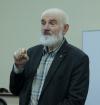Dzyatkovskaya E. N., Zakhlebny A. N. HUMANITARIZATION OF ENVIRONMENTAL EDUCATION AS A VECTOR OF ITS DEVELOPMENT UP TO 2030. LIFELONG EDUCATION: The 21st Century.
2021. № 1 (33).
DOI: 10.15393/j5.art.2021.6692
HUMANITARIZATION OF ENVIRONMENTAL EDUCATION AS A VECTOR OF ITS DEVELOPMENT UP TO 2030
 | | Dzyatkovskaya Elena N.
Doctor of Biological Sciences, Professor, leading researcher
Institute for Strategy of Education Development Russian Academy of Education
(Moscow, Russian Federation)
dziatkov@mail.ru |
 | | Zakhlebny Anatoly N.
Doctor of Pedagogy, Professor, Full Member of the Russian Academy of Education, chief researcher
Institute for Strategy of Education Development Russian Academy of Education
(Moscow, Russian Federation)
anzmos@bk.ru |
Keywords:
ecological education
humanitarization
ecological culture
Scientific Council on problems of ecological education of Russian Academy of Education. |
Abstract: the article deals with the scientific results of the Jubilee Plenum of the Scientific Council on the problems of environmental education of the Russian Academy of Education. A brief characteristic of the current state of ecological education in the country is given and perspective directions of its development are discussed. It is shown that during the last fifty years the activities of Scientific Council moved from organization of «nature protection school work» to development of theory and methods of teaching ecology as a biological discipline and then to the theory of integrated environmental education as the basis of formation of environmental education for sustainable development. The results of researches by members of Scientific Council on problems of theory and practice of general environmental education and ways of overcoming them are described. Relevance of development of philosophical, psychological, linguocultural bases for realization of outlook, integrating, culturological and culture-creative mission of modern environmental education is proved. It is concluded that the main vector of the Scientific Council activity on the development of environmental education till 2030 must be the humanitarization of its content: giving it a general cultural orientation by including in its content the multicultural experience of interaction with nature, values and traditions of nature-appropriate activities, environmental ethics; expanding the subject of knowledge in the natural-science, social and humanitarian field as a condition for understanding the environmental imperative and goals of sustainable development; orientation to the culturally appropriate education. The means and conditions of humanitarization of ecological education are considered. It is concluded that the results of the Scientific Council are of theoretical and practical importance for solving strategic problems of sustainable development of the country and the provision of ecological safety of its citizens.
|
Paper submitted on: 02/26/2026; Accepted on: 02/25/2021; Published online on: 03/26/2021.
References
- Alekseev S. V. To the question of the culture of sustainable development and its assessment. In: Biologiya v shkole. 2015. № 3. (In Russ.)
- Argunova M. V. Ecological education for sustainable development in secondary school: theory and practice. Moscow, 2009. 205 p. (In Russ.)
- Babakova T. A. The content of students' ecological world-view. In: Pedagogika. 2020. № 7. (In Russ.)
- Vinokurova N. F., Nikolina V. V., Efimova O. E. Methodological bases of formation of ecological culture of schoolchildren on the basis of ideas of ecological development. In: Obrazovanie i nauka. 2016. № 5 (134). P. 25–40. (In Russ.)
- Gorlachev V. P., Agadzhanyan A. N. Man: ecology, culture, education: monograph. Moscow, 2003. 178 p. (In Russ.)
- Dziatkovskaya E. N. Systemic approach to designing the content of general environmental education: monograph. Moscow, 2011. 132 p. (In Russ.)
- Zakhlebny A. N., Dzyatkovskaya E. N. Cultural approach to modern environmental education. In: Byulleten' Mezhdunarodnoj akademii nauk (russkaya sekciya). 2012. № 1. (In Russ.)
- Ermakov D. S., SuraveginaI. T. Ecological education: from studying ecology to solving ecological problems. Novomoskovsk, 2005. 146 p. (In Russ.)
- Erdakov L. N. Ecology. Textbook for elementary school. Tomsk, 2015. 205 p. (In Russ.)
- Mazurov Y. L. The Global Education Agenda and Russia's Participation in it. In: Byulleten' YUNESKO. Komissiya po delam YUNESKO. 2018. № 28. (In Russ.)
- Mamedov N. M. The meaning of environmental education: paradoxes of understanding. Collection of materials and reports. In: Ot ekologicheskogo obrazovaniya k ekologii budushchego. VI Vserossijskaya nauchno-prakticheskaya konferenciya po ekologicheskomu obrazovaniyu. Moscow, 2019. P. 184–185. (In Russ.)
- Marfenin N. N. Sustainable development of mankind. Textbook. Moscow, 2006. 612 p. (In Russ.)
- Panov V. I. Introduction to ecological psychology: textbook. Moscow, 2006. 184 p. (In Russ.)
- Pechko L. P. Expressiveness of aesthetics of nature and the culture of a person: monograph. Ulyanovsk, 2008. 140 p. (In Russ.)
- Pustovalova V. V. Metaphor in pedagogy: monograph. Moscow, 2016. 259 p. (In Russ.)
- Sayamov Y. N. Global processes and the modern world. In: Vestnik Rossijskogo fonda fundamental'nyh issledovanij. 2018. № 4 (93). (In Russ.)
- Sabrekova M. S. The formation of the moral and aesthetic component of the ecological culture of junior schoolchildren using the lapbook. In: Sovremennoe pedagogicheskoe obrazovanie. 2020. № 5. (In Russ.)
- Stepanov S. A. The conceptual foundations of environmental education for sustainable development in the scientific heritage of Academician N. N. Moiseev. In: Vestnik ekologicheskogo obrazovaniya v Rossii. 2011. № 4 (62). P. 9‒12. (In Russ.)
- Education for sustainable development in international documents and agreements. Moscow, 2005. 146 p. (In Russ.)
- Yasvin V. A. History and psychology of ecological culture formation: Is it comfortable to sit on the top of the pyramid? Moscow, 1999. 97 p. (In Russ.)
Displays: 2925; Downloads: 586;
DOI:
http://dx.doi.org/10.15393/j5.art.2021.6692













